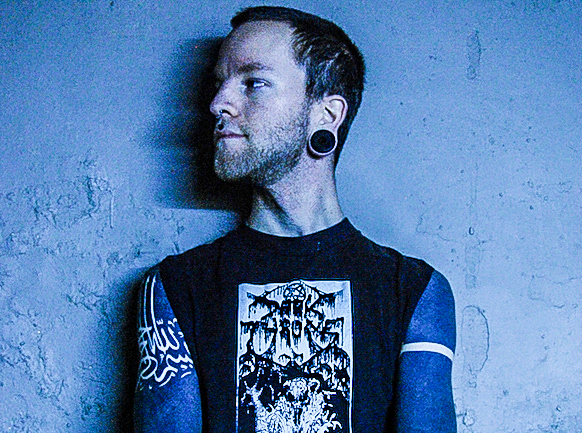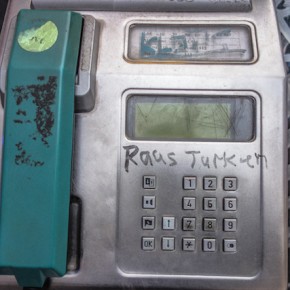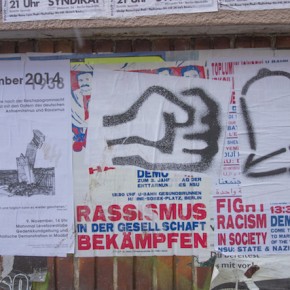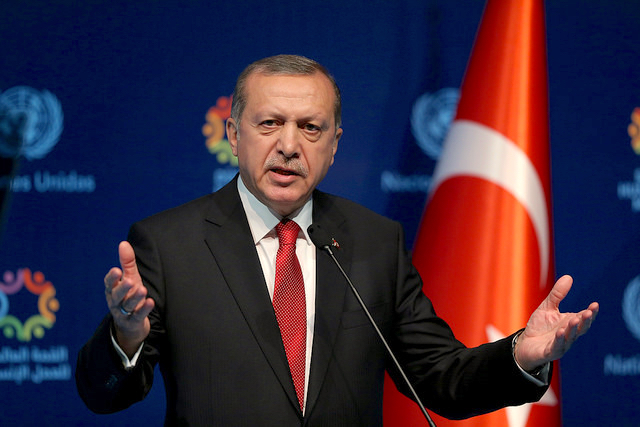Characterized by waves upon waves of feedback, atonal beats, and strange sounding squelches and squeals, power electronics is purposely and unapologetically abrasive, even more so than most noise music, of which it is a subgenre. To listen is to be immersed. Without that tonality, that rhythm, there is often little for the listener to grab onto but what is being put forward, thematically.
Perhaps due to its spot on the extreme edge of art and subculture, there is at times a certain lack of subtlety when it comes to the lyrics and imagery attached to power electronics. Illustrating that perfectly is the British band Whitehouse, which many credit with having created the genre. Naming themselves after both a British morality campaigner, and a pornographic magazine, Whitehouse epitomize everything that is transgressive about their genre. That being said, it’s not all about violent sex and endless war.
Portland-based noise musician Jackson Abdul-Salaam, who records under the name Herukrat and runs the Svn-Okklt tape label and website, has focused his attention instead on topics such as womanhood, religious persecution, and anti-terrorism. He is also a recent convert to Islam, a subject that dominates his most recent album I Bear Witness, which was released by the Canadian label Total Black.
Souciant: What kind of reception have you gotten since your conversion? The PE and harsh noise scenes are not exactly known for being exceptionally diverse or particularly accepting, especially when it comes to religion. I’d argue that it’s even worse with anything connected to Islam.
Jackson Abdul-Salaam: That’s only one of the masks that PE and harsh noise wears. It’s one of the external costumes the subculture has dressed up in, and it doesn’t very often reflect the performers themselves. And I’d go as far to argue that these themes aren’t even that prevalent in noise. You see way more anti-religious influence pop up in extreme metal. I have many good friends who make up the crux of the current US noise/PE scene, and generally speaking these people are some of the most friendly and supportive people I know. I’ve gotten more words of support and curiosity than anything else.
Souciant: Is Herukrat a goal-oriented project? Are you trying to accomplish anything with this more than just releasing music?
Jackson Abdul-Salaam: Over the course of this past year, I had a few goals set for where I wanted to the project to go, but these were pretty much all internal goals that only had to deal with my side of things. For example, doing a split release with The Rita was one of those dream ideas that actually wound up happening, so that was pretty exciting. Other than that, I wanted to release a serious full-length that I spent more time on than any of my previous efforts, and having a label like Total Black release it was an added bonus. Externally, Herukrat doesn’t have a particular goal. As in, I’m not necessarily trying to send a message to the listener or provoke a certain response from people. I feel accomplished as long as people are listening to and enjoying what I’m putting out.
Souciant: But things don’t necessary exist in that kind of vacuum. It’s obvious that you’re doing something very, very specific with Herukrat and it is very provoking. You mentioned having received a lot of support from people as well as “words of curiosity.” Is this coming from the noise scene or have you also heard from people in the Muslim community? Or were you referring to curiosity coming from the noise scene about your conversion and what you’re doing with this project?
Jackson Abdul-Salaam: In this instance, I mean getting a positive reaction and curiosity from people existing in the noise scene. These are people who are already used to extreme concepts, so having an idea introduced like this that is so far outside of the norm for noise has gotten a few people excited about the release and about Herukrat in general. I don’t really share my project with many personal friends or Muslim buddies.
From the perspective of somebody that hasn’t approached noise before, it can be a pretty shocking and confusing genre. I wouldn’t expect many Muslims to understand or enjoy the music, even if it’s about our religion, just as I wouldn’t expect any non-Muslim people who haven’t ever been exposed to PE/noise before to enjoy it at all.
Souciant: Can you explain how you go about making music? Do you start with a concept and build around that, or do you have a sample you want to use and go from there? Or is it more based around the music itself and ideas you have for that?
Jackson Abdul-Salaam: I always start with concept; I usually carry around an idea in my head until I feel like it’s time to lay it out into an album. After I have a concept ready to roll out, I start gathering samples that I want to incorporate into the actual recording. For I Bear Witness, I used mainly Qur’an recitation and dua’a recordings which I gathered from various sources. Once I’ve got my concept and my samples, everything from that point is pretty much improvised.
I sit on the floor and blast out a page of lyrics with whatever comes to me right before I hit record, then improvise pretty much all the noise while performing the vocals straight off the lyric sheet I had just written down. That’s when I really get into “the zone” and feel like I’m channeling some kind of creative power that’s beyond myself. I try and record an entire track at the same time, and am not a fan of layering multiple recordings of things over each other to build a track. For example, I don’t like recording the noise and then going back over and recording the vocals over the top, in a separate layer.
Souciant: Related to that, how do you go about getting a message across? Something that I’ve noticed in a lot of noise/grind/PE projects is that the messaging tends to come through in the album art, the samples, the names of the songs, and so on. That’s very much not how it works in more traditional forms of music, where the lyrics form a big part of the messaging.
Jackson Abdul-Salaam: I guess when it comes to presentation, I use everything at my disposal. I’ve always very strongly supported the opinion that the visual aspect of noise/PE is as important as the recorded material. For noise that is purely instrumental, everything is carried by the visuals that it’s presented alongside. As far as I Bear Witness goes, everything was intertwined – the samples, lyrics, and artwork.
Souciant: What are the positives and negatives of releasing your stuff online? I feel like it’s one thing when we’re talking about more traditional rock/pop stuff but for something like Herukrat which, as you said, relies on that visual aspect. It seems very daunting to try and capture that with mp3s and jpgs. Even if you could package everything in a way that included everything a physical release would, it’s still hard to get someone to pay attention to the image files when all they want to do is listen to the mp3s. Also, not having that tactile experience definitely makes it difficult, especially when you’re skipping the step of having to go through the cover art to get to the music, like with a physical release.
Jackson Abdul-Salaam: I think doing physical releases is everything in noise. Having the physical artwork, inserts, and extras that are often included are as much a part of the noise scene as the recordings themselves. Most people I know who are into PE/noise are collectors, so just downloading mp3s won’t really cut it for putting together a total piece. That being said, there are of course a few pros to putting things online. I always put up mp3s with scans of all images included with the release on Svn-Okklt when I put out a physical cassette. Not everyone is always going to have access to a tape player, or maybe getting a tape to the country they’re listening from is difficult and expensive. So, as far as getting exposure goes, mp3 certainly can play a big role.
Souciant: Do you see the music as a vehicle for the message? Is one more important than the other?
Jackson Abdul-Salaam: This is an interesting question, because I think there’s two ways you can approach it. Albums like mine that are fueled by a strong idea of concept are okay, but that’s only one half of noise. Noise for the sake of noise will always exist, and I think that’s just as important, if not more. A lot of noise/PE fans, including myself, are sometimes just interested something that is pushing the boundaries of sound. Sometimes I just want to hear an album that is massive, explosive, shifting and crumbling more than I’m going to care about the concept behind it. For me, it doesn’t have to be dressed up and fancy, it just has to be loud and extreme. That’s what I’ll always come back to, and the primary reason why I love noise.

Souciant: Do you feel like your dialogue with music, as far as creation/alteration, has changed since your conversion? Are you going about music making in any kind of different way?
Jackson Abdul-Salaam: I converted in the middle of the recording process of I Bear Witness. I had been studying Islam for quite awhile before that, of course, but it’s the first thing that had been 100% influenced by it. But, I don’t think it really changed my process drastically. For me, while I’m recording and giving all the energy I have into recording vocals and noise at the same time, I really lose myself in the zone of that moment, and it’s always been borderline spiritual. In that moment of giving it everything I got, and pushing it as hard as I can, it’s very cathartic and trance-like; it’s similar to being deep in prayer. It’s all a form of zikr (remembrance of Allah) in one way or another.
Souciant: If the act of making music for you is a form of zikr, do you consider the actual songs to be a type of nasheed?
Jackson Abdul-Salaam: While I suppose noise technically falls under the requirements of being nasheed, I am not very interested in considering it so. This is mainly because the concept of nasheed exists as a response/solution to the opinion of some conservative Muslims that the Qur’an and certain hadith of the Prophet Mohammad (s) outlaw music in Islam as being haram. I reject this belief, and think the interpretation is invalid, and the sources of the supposed hadith the view is based on, are untrustworthy, at best.
Souciant: On that topic, is this secular or religious music? Both? Something entirely different? When I think of harsh noise having a religious influence, my first real reference is Clang Quartet. Between my slight knowledge of his music and the shows I’ve seen him on – and a bit of Google-aided research – it doesn’t seem like he ever plays on actual Christian bills, despite being very outspoken about his religious beliefs and their influence on his music. I really like this quote from an interview he did a couple months back: “I’m not going to get on some pedestal and tell people what to believe. I hope what I’m doing inspires people in a spiritual direction, but I like when I inspire people from an artistic direction.” Is that similar to how you’re going about things?
Jackson Abdul-Salaam: Herukrat is not a “pro-Islam” project, and I don’t plan to continue to use the concept of Islam over and over for all my albums. The last release for instance, (the split with The Rita) went back to using more traditional noise themes. In this case we used concepts already familiar to people who listen to The Rita — ballet and actresses. However, that being said, I Bear Witness is definitely an Islamic album, that is inescapable. It is religious noise, but it isn’t really intended for religious people, nor is it particularly intended to spread the message of Islam.
I’m not altogether interested in preaching to people about my beliefs, but of course power electronics has always been the perfect platform to get up and scream about your unpopular opinions, right? Hah. That quote from Clang Quartet is very close to what I could say my intent is, although I’m not quite “hoping to inspire people in a spiritual direction.” It is interesting and welcomed if it has that kind of impact on somebody, but it isn’t my number one aspiration here.
Souciant: Is this album more personal than previous work?
Jackson Abdul-Salaam: Yeah, this is the most personal album I’ve recorded so far. Alleviation Prayer was the first tape I put out under Herukrat, which was based on the influence and experiences of a few different women in my life, so that one was pretty close I guess. But overall, it felt less passionate than this one did. That could be because I spent much less time on that album, and more time and resources in general went into I Bear Witness. Other releases like Anna Karina and Conflict are still about interests that play some kind of role in my life, but they have much less to do with me and more to do with things existing outside myself and experience that I have chosen to focus on.
Souciant: Last question! What’s the scene like in Portland these days, and what do you get out of it as a musician and as a fan? What is your religious community like? I feel that religion is very much a subculture and a community in its own way. Do you find yourself drawing parallels between the two? Have you found it at all difficult to feel 100% grounded in both at the same time or is that something you’d even want?
Jackson Abdul-Salaam: The Portland scene isn’t bad. I’m not really into punk much these days, but it was really good for that when I had more interest in it. There’s some fantastic local metal between Portland and Salem… Knelt Rote, Hell, Ash Borer, etc. etc. and of course we’re a major spot for a lot of touring bands. This past summer I saw Earth, Boris and Acid King in the same month, which probably all exist in my metal top 10. I haven’t really made any HN/PE connections in town though in the two years I’ve been here. I know it exists at least a little, but definitely nothing like the scenes going on in Chicago, the Bay Area, and so on.
I also don’t have a religious community here in my city. All my Muslim friends live spread out over the country, but fortunately a lot of them are in the Bay Area, which I try to visit every few months. The mosque where I took my Shahada (Masjid al-Iman) is in Oakland, and I try to visit every time I make my way down to California. There are very few parallels that can be drawn between a religious community and noise community besides a strong sense of passion, I suppose. But it is that exact passion that exists in both realms of my life (noise and religion) that motivates me to work as hard as I can on both of my paths, and that give each path my own unique take on it.
Photographs courtesy of Blackmetalbrews and svn okkult. All rights reserved.





